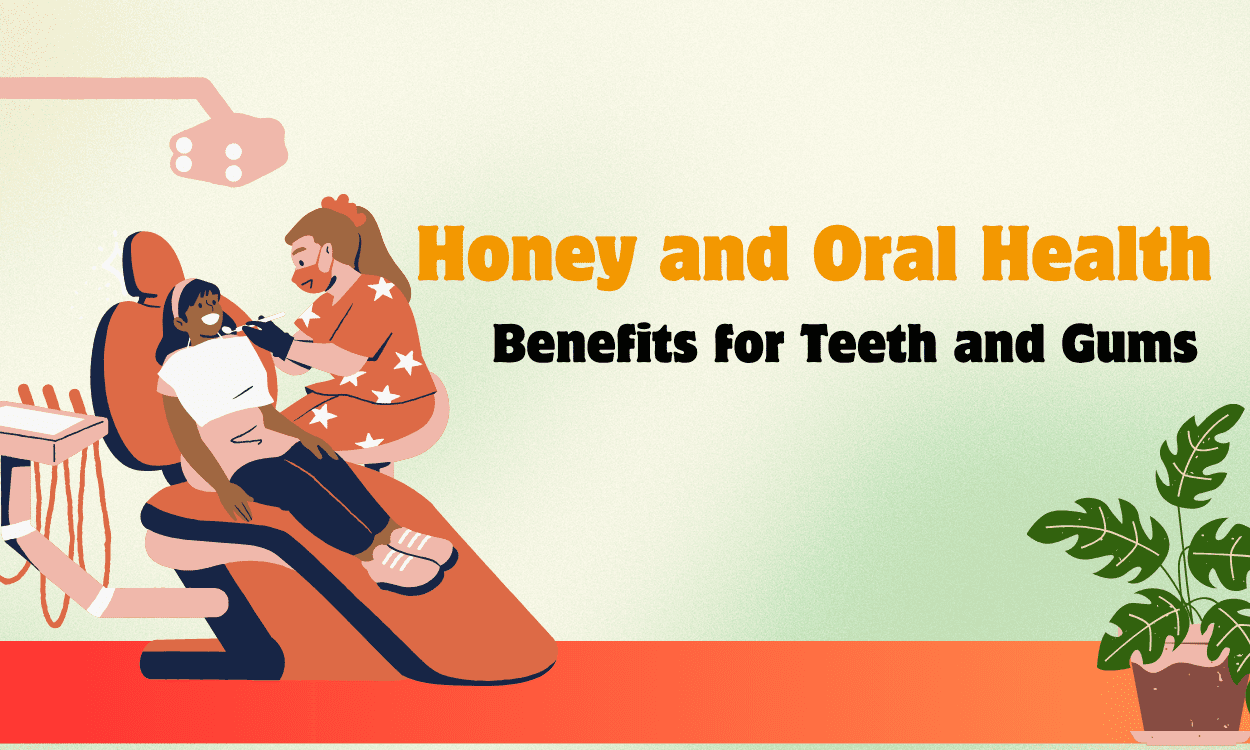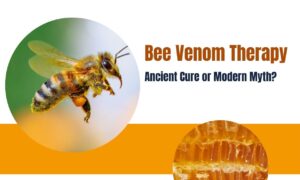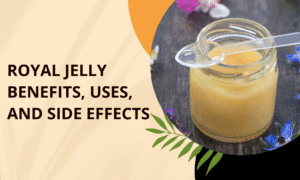Bee Venom Therapy: Ancient Cure or Modern Myth? For centuries,...
Read More

Honey and Oral Health: Benefits for Teeth and Gums
For centuries, honey has been celebrated as one of nature’s purest gifts—a golden nectar known for its healing, nourishing, and rejuvenating properties. While it’s often associated with soothing sore throats or boosting immunity, few people realize that honey can also play a valuable role in oral health.
Modern science is beginning to uncover what ancient civilizations already knew: honey, when pure and unprocessed, offers remarkable benefits for teeth and gums. Far from being just a natural sweetener, honey can help prevent infections, heal mouth ulcers, and even fight bacteria responsible for tooth decay.
Let’s explore in detail how honey supports oral hygiene, the science behind its antimicrobial properties, and how you can safely incorporate it into your dental care routine.
1. The Science Behind Honey’s Healing Power
Honey is a complex natural substance composed of over 200 compounds, including enzymes, antioxidants, vitamins, minerals, and organic acids. Its most potent property for oral health lies in its antibacterial and anti-inflammatory effects.
Pure honey produces hydrogen peroxide when it comes into contact with saliva or bodily fluids, creating an environment that kills harmful bacteria while being gentle on healthy tissues. This natural antiseptic effect makes honey an effective aid for healing wounds, including those inside the mouth.
Additionally, honey’s low water content and high sugar concentration inhibit bacterial growth by drawing moisture away from bacteria through a process called osmosis. In simpler terms, honey dehydrates harmful microbes, preventing them from multiplying in your mouth.
2. Fighting Gum Disease Naturally
Gum diseases such as gingivitis and periodontitis occur due to bacterial plaque buildup along the gum line. If left untreated, they can cause inflammation, bleeding, and even tooth loss.
Studies have shown that honey, particularly raw and unprocessed varieties, can significantly reduce plaque and gingival bleeding. The antimicrobial enzymes in honey—such as glucose oxidase—help eliminate the bacteria that trigger inflammation in gums.
Furthermore, honey’s anti-inflammatory properties soothe swollen and painful gums, offering natural relief without harsh chemicals. Applying a small amount of pure honey directly onto the affected gums can accelerate healing and reduce discomfort.
Regular use of high-quality honey like Aravalihoney can help maintain gum health, especially when used in moderation and as a part of a balanced oral hygiene routine.
3. Honey’s Role in Preventing Tooth Decay
At first glance, it might seem counterintuitive to suggest that something sweet could prevent cavities. However, the natural composition of honey sets it apart from processed sugars.
Refined sugars—found in candies, sodas, and processed foods—feed harmful oral bacteria, particularly Streptococcus mutans, which produce acids that erode tooth enamel. Honey, on the other hand, contains compounds that actively suppress bacterial growth rather than promote it.
Research from the University of Waikato in New Zealand found that certain types of honey, such as manuka honey, inhibited the growth of cavity-causing bacteria more effectively than sugar substitutes. Honey also helps neutralize oral pH, reducing acid levels that contribute to enamel erosion.
When used responsibly, honey can help maintain a healthier oral microbiome, keeping the balance between good and bad bacteria in check.
4. Healing Mouth Ulcers and Canker Sores
Mouth ulcers and canker sores are small, painful lesions that can form inside the mouth due to stress, injury, or infection. Honey’s soothing texture and healing compounds make it an excellent natural remedy for these issues.
Applying honey directly onto ulcers provides a protective coating, reducing irritation while promoting faster healing. Its antibacterial properties prevent secondary infections, and its natural enzymes stimulate tissue regeneration.
A clinical trial published in the Journal of Oral Rehabilitation demonstrated that honey significantly reduced pain, redness, and healing time in patients with recurrent mouth ulcers compared to conventional treatments.
For those seeking a gentle, chemical-free solution to oral discomfort, honey is both safe and effective.
5. Combating Bad Breath Naturally
Bad breath, or halitosis, often results from bacterial buildup in the mouth, gum infections, or poor digestion. Since honey naturally kills odor-causing bacteria, it can help neutralize bad breath from its root cause.
Rinsing your mouth with a mixture of honey and warm water can act as a natural mouthwash—freshening your breath while keeping your gums hydrated and bacteria-free.
Additionally, honey’s mild sweetness leaves a pleasant aftertaste without the artificial flavoring or alcohol found in commercial mouthwashes, which can sometimes dry out the mouth and worsen bad breath over time.
6. Strengthening Oral Immunity
Honey is also rich in antioxidants, such as flavonoids and phenolic acids, which help strengthen your oral and overall immune system. These antioxidants neutralize free radicals that cause cell damage in gum tissues, supporting long-term oral health.
Moreover, honey contains trace amounts of vitamins and minerals—including calcium, phosphorus, and magnesium—that contribute to strong teeth and jawbones. By consuming honey regularly in moderation, you’re not just benefiting your mouth but also improving your overall immunity and resistance to infections.
7. How to Use Honey for Oral Health
While honey can be a valuable addition to your oral care, it’s important to use it correctly. Here are some effective and safe ways to incorporate honey into your daily routine:
1. Honey Rinse for Fresh Breath
Mix one teaspoon of honey in a cup of warm water and rinse your mouth for 30 seconds. Do this once daily to reduce bacteria and keep your breath fresh.
2. Gum Massage for Relief
Apply a small amount of raw honey to your gums using a clean finger and gently massage it for 1–2 minutes. This helps reduce swelling and improve circulation in the gums.
3. Honey for Mouth Ulcers
Dab a few drops of honey directly onto mouth ulcers two to three times a day. This reduces pain and speeds up healing.
4. Honey with Herbal Mouth Rinses
You can combine honey with herbal ingredients like clove or turmeric to enhance its antibacterial and healing properties.
5. Post-Meal Honey Cleanse
After meals, swirl a teaspoon of honey in your mouth before rinsing with water. This can help remove food particles and inhibit bacterial growth.
Important Tip: Always choose pure, raw, and unprocessed honey. Processed honey loses many of its beneficial enzymes and may contain added sugars that can harm teeth instead of helping them.
8. The Right Honey Makes All the Difference
Not all honey is equal in terms of purity and therapeutic value. Many commercially available products are heated, filtered, or mixed with syrups, reducing their potency and nutritional quality.
Pure honey sourced from natural environments, retains its enzymatic strength and antioxidant profile, making it ideal for both consumption and oral care. With its unadulterated composition,
When choosing honey for oral health, always ensure that it’s raw, unprocessed, and free from additives. The more natural it is, the more effective it will be in promoting dental and gum health.
9. Myths vs. Facts About Honey and Oral Health
Myth 1: Honey causes cavities because it’s sweet.
Fact: While honey is sweet, it doesn’t behave like refined sugar. It contains antibacterial compounds that help fight cavity-causing bacteria rather than feeding them.
Myth 2: Honey sticks to teeth and harms enamel.
Fact: Raw honey actually creates a protective layer that can prevent bacterial acid from eroding enamel when used properly.
Myth 3: Honey isn’t as effective as commercial mouthwash.
Fact: Studies have shown honey to be equally or even more effective than some antiseptic mouthwashes in reducing plaque and gingivitis.
Conclusion
Honey’s benefits extend far beyond sweetness—it’s a natural protector for your teeth and gums. Its antibacterial, anti-inflammatory, and healing properties make it a safe and effective alternative to chemical-based oral care products. From reducing plaque and healing ulcers to combating bad breath and strengthening gums, honey is truly nature’s gentle yet powerful remedy for oral health.
By using pure, high-quality honey in moderation and maintaining regular brushing and flossing habits, you can achieve a healthier, fresher smile naturally.
Also Read here
Beeswax Wraps: An Eco-Friendly Alternative to Plastic
Beeswax Wraps: An Eco-Friendly Alternative to Plastic Plastic has become...
Read MoreRoyal Jelly: Benefits, Uses, and Side Effects
In this blog, we explore what royal jelly is, its...
Read MoreHow Honey Marinades and Glazes Improve Meat and Veggie Recipes
we’ll explore how honey works in marinades and glazes, why...
Read More


